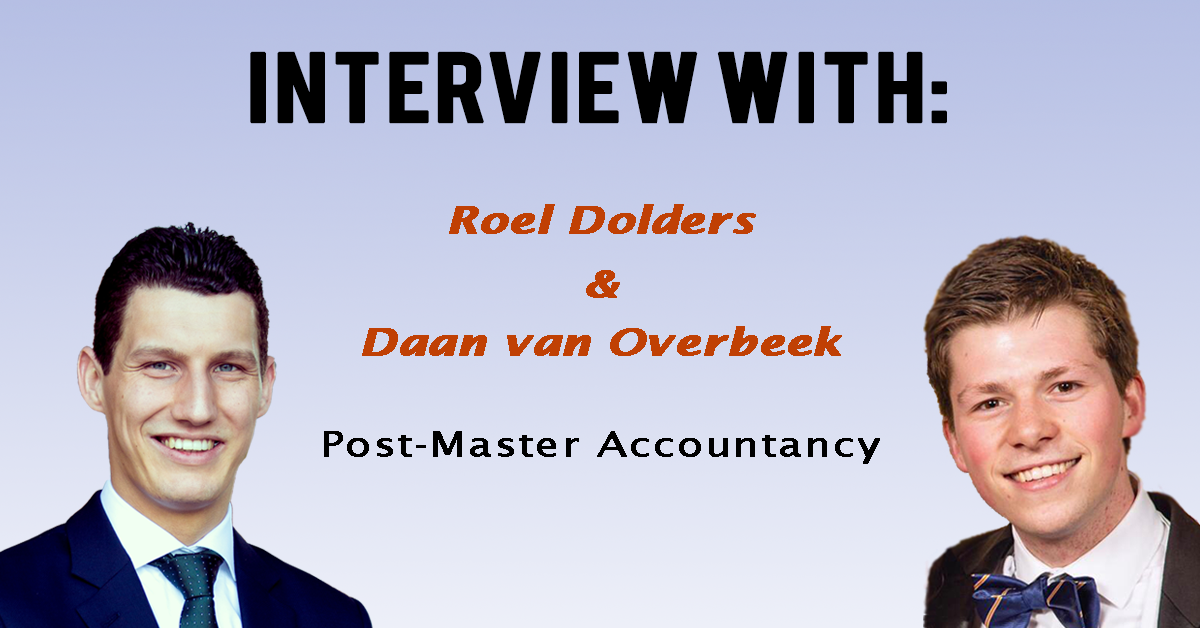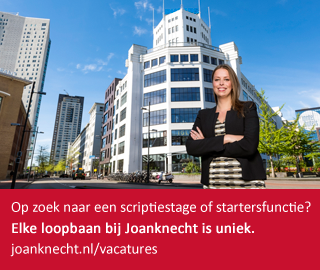To what extent is the accountancy sector prepared for auditing non-financial information? Read it in this column by prof. dr. Bart Dierynck!

To gain a better understanding of life after the Accountancy master’s program, we spoke with two Post-Master students who are at the beginning of their Accountancy career. Daan and Roel, both living in Tilburg. Daan is 24 years old and currently works at KPMG in Breda. Daan obtained his bachelor’s degree in Wageningen and he went to Utrecht for an Accountancy minor. He completed the Accountancy master in Tilburg, where he is now a student of the Post-Master. Roel is 25 years old and currently works at PwC in Eindhoven. Roel obtained his bachelor’s degree in Den Bosch and he finished the pre-master and master Accountancy at Tilburg University. Just like Daan, Roel is now a Post-Master student at Tilburg University.
Daan and Roel are both second-year students of the Post-Master Chartered Accountant and therefore already have been working for a while as an accountant. We asked them how their activities currently look like.
They both agree that every day is different. “I spend a lot of time working at the location of the client, way more than working at the office,” says Daan. “Most of the activities are done at the location of the client to shorten communication lines. This is more practical than working at the office,” confirms Roel. There is also quite some variation in the teams you work with. Roel: “Currently I have eight different clients and therefore I work with eight different teams, with quite some variation in the size of the teams. When you are part of a team consisting of five persons you see each other a lot, which is definitely not the case when you are part of a team consisting of thirty persons.” Daan prefers to work in smaller teams and therefore chose to work at Breda since this office is smaller compared to the one in Eindhoven. He enjoys working with smaller and less formal clients. He says that the work at these clients is somewhat broader, but less deeply. Daan: “Currently I have eleven clients and therefore I work in eleven different teams with most of my clients located near Tilburg.” Daan and Roel both agree that their work is very social since the place of the location where you have to work differs almost every week and therefore you are working with a lot of different colleagues.
At first it seems nice: still being a ‘student’, but also working and earning money. But is this even to combine? We asked Daan and Roel about their experiences. Currently, they both work 4 days a week and they have classes on Fridays at Tilburg University.
“It is doable, but it’s still quite intense”, says Roel. “Self-study takes about six hours a week and this has to be done in the evening hours or during the weekend. Besides the classes on Friday, you have deadlines every week. If I am having a busy weekend, I have to do most of the self-study during the evening hours.” Daan continues. “Of course your employer understands that it can be quite hectic combining work and your study. They will give you some space if needed, especially during the first six months. If you mention that you need some extra time in advance, this will be taken into account in the planning.” Roel agrees. “You get the time off of work as long as you mention it in advance. The company then takes it into account. What a big advantage of the accountancy profession is, is that you get a lot of vacation. You get about thirty vacation days. “This is mainly because the company can usually miss some accountants during the summer,” Daan says. “It is a nice reward for all the hard-working during spring.”
“If you raise the alarm in advance, there are always people at our large offices who are willing to help you.”
They are both satisfied with the amount of free time they have left. “In the business season at the accounting firms, you do not have lectures from January till March,” says Daan. “The University then takes into account that it is already busy enough. Busy season, therefore, feels more like you have some extra free time. You do work more hours per day, but you have less on your mind. You don’t have to focus on your study, so you can purely focus on work.” Furthermore, there is also enough room for other, informal activities at both companies. Daan and Roel, for example, mention ski trips with colleagues, staff parties, sports tournaments, and gala events.
Most students who have obtained the master’s’ degree of Accountancy continue their studies with a Post-Master’s degree. But is this entirely complementary? We asked Daan and Roel about their experiences.
“The connection between the masters is not very good.” They both agree. “During the master program, you only get theoretical subjects, but not really the reasoning behind it and tasks you are going to do. You only learn this during the post-Master or during work,” says Roel. “In the post-Master, everything falls into place and there you learn courses that you can immediately apply into practice. That makes it a lot more fun,” Daan continues.
It is no secret that people think that junior accountants are often being thrown into the deep. The idea of working more than 60 hours a week prevails over the Big Four in particular. To get a definite answer about this, we asked Daan and Roel for their opinion about the workload at their company.
“Yes, the workload of accounting firms is high,” Daan starts. “However, you can control this by yourself. If you raise the alarm in advance, there are always people at our large offices who are willing to help you.” Daan also indicates that, as mentioned earlier in this article, they are not or are not yet able to perform all the work activities, which means that the workload is especially high at positions higher than theirs.
“Workload is also relative,” Roel continues. “Some people experience a lot of pressure when working 8 hours a day, while others only experience this when working 10 hours a day. I, myself notice that there are alternating periods of workload. Some periods are, of course, busier than others. You can also compensate for the busy periods with vacation days!” Both Daan en Roel think it is especially crucial to find a good balance between work, study, and personal life.
Before ending the interview we asked Daan and Roel if they have a few tips for future starters. Their best tips from our conversation are:
“Don’t forget to do fun stuff. Know where you get your energy from!”
“Try to stay on top of things. Accumulation of many small tasks can cause additional pressure.”
“Dare to say NO. You determine for yourself how busy you are.”


To what extent is the accountancy sector prepared for auditing non-financial information? Read it in this column by prof. dr. Bart Dierynck!

The Brexit is postponed again! Clearly, the Brexit will influence business in The Netherlands. Will the accountancy sector be influenced? Read it here!

Is accountant zijn gevaarlijk? Zitten er te veel persoonlijke risico’s aan het maken van fouten? Lees het in dit interview met prof. dr. Anna Gold.